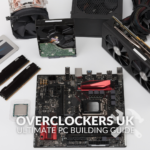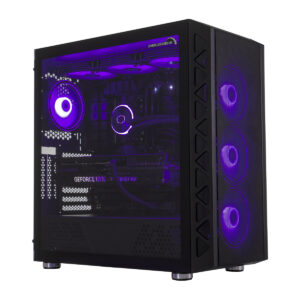One huge benefit of having a desktop PC is the fact you can upgrade them. But why and when should you be doing this?

With easily accessible chambers, future-proofed hardware with clear upgrade paths, and plenty of new tech to choose from, updating components is a great way to squeeze more performance out of your gaming PC. You don’t have to spend loads on a whole new PC, and that ultimately reduces e-waste, too! In this article, we’ve got all the information you need to help you decide when and why you should upgrade your PC.
When Should I Upgrade My PC?
There are a lot of components that make up a functioning PC. Some of them create a more noticeable difference to performance than others. On top of this, technology is moving more rapidly than ever before, and manufacturers are constantly innovating to make these components faster, smaller, and more efficient. Minor tweaks and improvements are made all the time, and products are being released with an array of new features. It makes it easy to get caught up in this cycle and feel like you have to upgrade well before you need to. The truth is we see major changes in PC hardware far less frequently than product releases would have us believe.
So, the when of it all should really fall down to your own needs. If your PC is starting to get a little slow, your storage is running low, or that fan is making that god-awful noise again – these are the moments when you should consider upgrading. As much as we want to buy the next flagship CPU or GPU upon release, it’s not always needful.

How Do I Know When My PC Needs Upgrading?
Expanding on the when you know, the time to upgrade your PC is when you notice it impacts your day-to-day use. That moment when you go from seamlessly being able to handle your workloads to frustrating lag, noisy components, and slow performance affecting your joy. Or as I like to call it, the “I’m going to yeet this PC out the window soon!” moment. (For legal reasons, we do not recommend throwing your PC out the window.)

Naturally, there are other instances where it will become apparent you need an upgrade. Those who are new to gaming and bought a relatively low-spec PC may find they need something with a little more oomph as they move into new gaming territories. Perhaps you have discovered a love of graphic design and your CPU with integrated graphics just isn’t cutting it. Maybe your gaming library grew too quickly and there just isn’t enough storage space anymore!
Basically, it boils down to when your current PC is no longer fit for purpose. This could be because of catastrophic hardware failure or down to a growth in your own interests. For example, I bought my last upgrade when my laptop would no longer connect to the internet or play Tabletop Simulator without crashing. Made game night with the sisters really difficult!
Why Should I Upgrade My PC?
This is an important question to answer before you dive straight in and begin filling your basket with shiny hardware. You need to pinpoint the reason for your upgrade and identify the best hardware for the job. Using my Tabletop Simulator crashing example, the computer I was using just did not have enough RAM to deal with loading all the bigger games, so it was apparent I needed to increase the capacity.
There is a myriad of problems you can solve with spot upgrades like that, such as replacing your PC case, fans, and cooling system to reduce noise levels and improve component longevity. A relatively easy way to boost responsiveness and reduce loading times is to add an SSD to your storage.

These solutions provide an answer to active problems within your hardware. There are other whys. As we touched on earlier, your gaming PC may work perfectly fine, but just not how you need it to. For example, your current hardware may not have or support the features you need. This could be anything from supporting features like real-time ray tracing to using the latest hardware standards for faster performance.

Another reason to upgrade is to fix hardware vulnerabilities. Unfortunately, security exploits make your PC susceptible to attack. Spectre and Meltdown were a huge problem when the news first broke back in 2018. There are software patches to address the issues, but there is some evidence that these might harm performance and the only way to completely avoid the problem is new hardware.
When Should I Upgrade Each Component?
When it comes to each component, they all have significantly different shelf lives. We live for the chaos. Some of your longer living hardware will be the PC case, fans, coolers, and power supplies, with them often only needing to be changed to meet aesthetics or improve cooling. Some modern power supplies have a huge twelve-year warranty, just to give you an idea of how long they will last!

We’re going to go into each component here, but if you would like a deeper look into the longevity of your gaming PC, we have a dedicated article for you.
From Storage to Graphics
An easy upgrade is your storage. While both HDDs and SSDs have relatively long shelf lives, they can often need replacing well before critical failure due to an increased need in capacity or speed. What’s more, SSDs are far better for storing your operating system, programs, and games as they are much quicker thanks to a lack of moving parts. It will improve your experience dramatically with faster boot times and a more responsive desktop.
Three components that usually need upgrading together are your processor, motherboard, and RAM. If you want to upgrade to a new generation of processor, it’s likely that it will use a different socket and even support a new memory standard. As a result, your motherboard and memory will need upgrading too.

On the other hand, if you just want to increase your RAM capacity to handle newer game specs or heavier workloads, then upgrading solo here will work. So long as you stick to the same standard your CPU and motherboard support. While 14th Gen Intel does support both DDR4 and DDR5, they use different physical interfaces. That means your motherboard will be limited to working with just one of them. If you want those sweet DDR5 speeds, you’d need to make sure your motherboard is up to the task. Of course, upgrading your motherboard will grant you access to features such as PCIe 5.0 and improved cooling.

If you’re a gamer, the GPU is the most important component in your system, and it will make the most dramatic difference to performance. It’s also relatively easy to upgrade, thanks to backwards compatibility with PCIe. You mostly just need to make sure your PSU provides enough headroom – especially with some of the more power-hungry modern graphics cards.
NVIDIA and AMD make regular improvements on their hardware, but you won’t need to upgrade every time they do. A good yard stick for when to make your GPU upgrade is to judge it on the settings you’re playing the latest AAA games at. If you’re consistently on the low settings, when you’d rather be chilling in ultra-high settings, then it is probably time for a change.
Shop Now at Overclockers UK
We’ve hit the when and why, even dabbled a little in the what. Now, we bring you the where. As in, where to buy all these upgrades. At Overclockers UK, we pride ourselves on being PC experts and, as such, have an extensive range of PC components to meet every budget, gaming, and performance need. We stock the latest and greatest hardware at the bleeding edge of technology from big-name brands and offer competitive prices on older gen tech so you can get a boost on a budget. We have dedicated buttons for every component here, to kick start your upgrade research and shopping!

To help you with all your PC building needs, we have put together a hub of all the articles you should find useful.
When Should I Buy a New PC Instead of Upgrading?
Sometimes it’s not always possible to upgrade your system and you might have to build a new one to get the performance you’re after. There are three main reasons why you should opt for an entirely new PC, rather than upgrading here and there.
First, catastrophic failure. If all your hardware is on its last legs and crumbling under the weight of your gaming demands, new PC.
Second, it’s too old to be compatible. With both hardware and software, you will find a point where spot upgrades will only get you so far. Technology will leave you and your beige beast behind. In that case, new PC.

The final reason is when it is no longer cost effective to upgrade. It may be that you are levelling up your gaming PC to take on the latest AAA games in stunning 4K resolutions, and the sum of all the parts you need will cost more than a whole gaming PC. In that situation, it may be smarter to just get the PC.
Should it be the case that a whole, fresh gaming PC is for you, then our complete collection awaits.
Learn More About Gaming PCs
If you’re in the market for an upgrade or two, we’ve got plenty of articles to help inspire your specification.
When Do You Upgrade Your PC?
In truth, the whole upgrade process is personal. There will be plenty of factors informing when and why you get an upgrade. So let us know in the comments what fuelled your last upgrade!




I upgrade components every year, but it’s different components over a three year period ie GPU one year next year, motherboard, cpu, and ram(ram only if it’s not possible to use existingram). Next is storage, then PSU, etc. This keeps huge costs to a reasonable amount every year.